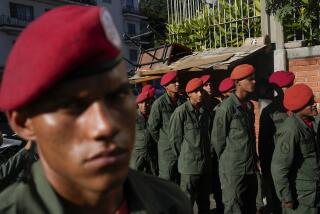Gorbachev Gets OK for Votes on Land, Unity Pact
- Share via
MOSCOW — A testy Mikhail S. Gorbachev, reasserting his leadership in Parliament, won backing Monday to launch key referendums on retaining a united Soviet Union and on permitting the private ownership of land.
The Soviet president also gained the approval, largely symbolic, of the Congress of People’s Deputies, the national Parliament, for his blueprint to reunite the country’s restive republics in a renewed union.
But several of the 15 republics are likely to refuse to hold the referendums, and the name of that union may differ from that planned by Gorbachev.
He had proposed to replace the ideological “Socialist” in the “Union of Soviet Socialist Republics” with “Sovereign,” but the Congress, living up to its reputation as a highly conservative body, voted 1,365 to 189 to recommend that the old name be retained.
The vote, orchestrated by Congress Chairman Anatoly I. Lukyanov, brought a wrathful outburst from Gorbachev, who snapped, “I don’t understand why these maneuvers are going on here, including by the chairman.”
That Gorbachev would lash out at Lukyanov, who has always been a model of loyal devotion, reflected the deep trouble in his inner circle, which has already been shaken in the past week by Foreign Minister Eduard A. Shevardnadze’s dramatic resignation and rare criticism from Prime Minister Nikolai I. Ryzhkov.
Gorbachev continued in a sharp tone to propose the two referendums, asserting his constitutional right as president to introduce legislation.
They passed easily, each garnering only a few dozen “no” votes among the almost 2,000 deputies.
But deputies did question why a nationwide referendum is required when the republics should be able to decide for themselves whether they want to remain in the Soviet Union under the terms of a new union treaty. Gorbachev won approval on Monday for the outline that will be used as the basis for treaty negotiations with the republics.
The Baltic republics of Latvia, Lithuania and Estonia, as well as the southern republic of Georgia, have announced that they want full independence, but the vast Slavic heartland and Central Asia appear willing to remain joined--on their own terms.
Gorbachev’s response to the deputies was angry: “We are talking about the expression of the people’s will on the core question of the life of the country.”
Several lawmakers also protested that it is foolish to hold the referendum on the country’s unity nationwide when it is really only needed in republics that are openly seeking secession.
But Gorbachev stuck to his formula that every single citizen of the Soviet Union must be asked if he backs “a renewed union as a federation of equal Soviet socialist sovereign republics.”
In a clear concession to conservatives, he added the word socialist to the language of the referendum after the vote on the country’s name, saying that “the Congress has taken its position and I join it.”
Philosophically, Gorbachev argues that the questions on the two referendums are so important that the people must be asked directly.
Tactically, however, the referendums allow him to get around the defiant parliaments of the country’s 15 constituent republics, all of which have declared their sovereignty.
The question of private land ownership is one of the most divisive in Soviet society. Reformists argue that only farmers who own their plots truly care about what they produce, while Communist Party hard-liners warn that if land is bought and sold, an exploitative landlord class will be created.
Gorbachev has declared himself against the purchase and sale of land.
The parliaments in the Russian Federation and the Baltic republics have already approved private ownership, however, and deputies said those republics would probably not agree to holding referendums on the question.
Col. Victor Alksnis, a self-described “hawk” from Latvia, told reporters that those who observe how easily Gorbachev’s proposals passed could be deceived into thinking that the Soviet president still enjoys massive support in the country.
In fact, “what is happening at the Congress is starkly different from what is happening outside,” Alksnis said. “Whereas Mikhail Gorbachev’s rating in the country as a whole stands at 20%, at the Congress he is, on the contrary, supported by 80%.”
Polls show that the Congress’ attitude toward a new union treaty also differs greatly from that of the general public. A bare majority, 52.7% of people polled in 23 places around the Soviet Union by the Parliament’s polling service, said they believe that the Soviet people “are so closely knitted together that no division is possible.”
Gorbachev’s real test is expected to come today or Wednesday when the Congress is expected to vote on the president’s proposal to expand his executive powers under a general reorganization of the government that would create a vice presidency and a small cabinet.
Passage would require approval of two-thirds of the Congress’ 2,250 members, when barely two-thirds have been showing up on typical days since the session began a week ago.
Alksnis and the powerful Soyuz group of about 400 conservative deputies he represents raised another challenge to Gorbachev on Monday with a proposed resolution that the lawmakers be actively involved in formulating Soviet policy in the Persian Gulf from Jan. 5 through 14, the eve of the deadline for Iraqi President Saddam Hussein to withdraw his forces from Kuwait.
“Any participation by the Soviet Union in military activities against Iraq is impermissible, because it contradicts the state interests of the Soviet Union,” the draft resolution said.
More to Read
Sign up for Essential California
The most important California stories and recommendations in your inbox every morning.
You may occasionally receive promotional content from the Los Angeles Times.











